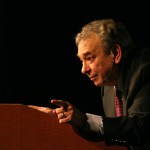 Tom S. Rainer writes:
Tom S. Rainer writes:
The moment they hear it, but the meaning is still similar. “People” is never defined. The true complainer is never identified. It is one of the most frustrating and demoralizing sentences pastors and staff will hear. Here are some reasons for the frustration:
The complainer lacks the courage to speak for himself or herself. So he or she hides behind the deceitful veil of “people are saying.” Leaders in churches know that when complainers lack courage to speak for themselves, or when they have to hide behind anonymous complainers, they are trouble in the making.
The leader has no recourse or action to take. These complainers never identify the source or sources. So the pastor or staff person cannot follow up and speak directly to the dissidents. He or she is left with a complaint that cannot be resolved due to anonymity.
The leader immediately questions the motive of the complainer. The moment the ministry leader hears those words, “People are saying . . . “, he or she doubts the credibility and the heart of the complainer. The approach is cowardly; it thus is always seen through the lens of doubt and frustration.
This approach is a double frustration for the ministry leader. First, he or she has heard yet another criticism. Most ministry leaders have to deal with criticisms too often. Second, the ambiguity of the complaint and the source of the complaint can leave a leader wondering if the problem is really bigger than reality. He or she can waste a lot of emotional energy on something that really may not be such a big deal.
Indirect criticisms can be the most painful criticisms. Most ministry leaders deal better with someone who is direct and precise in his or her concerns. But indirect criticisms such as “People are saying . . . “ or “I love you pastor, but . . . “ hurt more because cowardly actions and duplicitous behavior are added to the criticism itself.
As a leader in a local church and in other places, I got to the point where I did not entertain such veiled criticisms. I tried to be polite and say, “I am sorry, but I cannot listen to you further because you will not give me the specific sources of the concerns. If you are willing to name those people specifically or, even better, get them to speak to me directly, I will be happy to hear the concerns.”
Has my approached worked? Frankly, I don’t recall any of these critics being happy with my response. But I have had to learn that there are certain people in churches and other organizations who have the spiritual gift of complaining. And they will exercise that gift frequently and with vigor.
I have to move on to those who have positive and encouraging solutions. Life is too short to deal with cowardly complainers.

